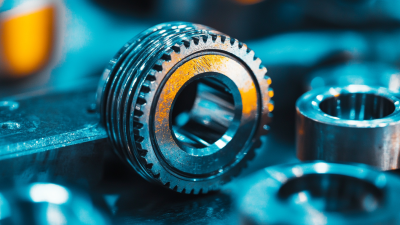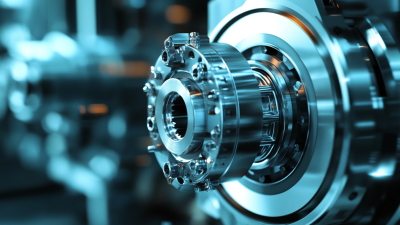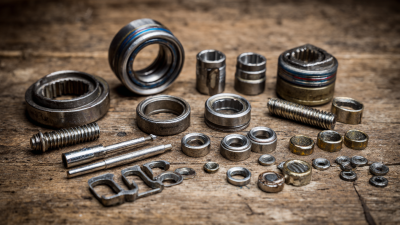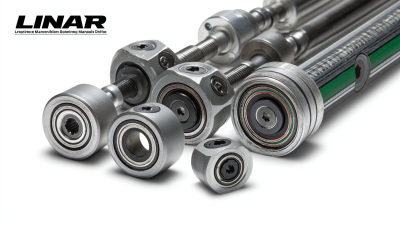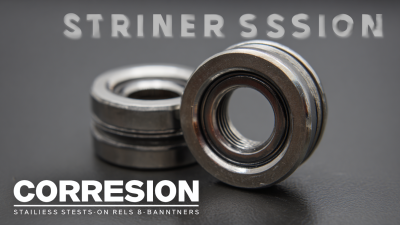Unlocking Efficiency: The Advantages of Partnering with an Automotive Bearings Manufacturer
In the ever-evolving automotive industry, efficiency and precision are paramount to maintaining a competitive edge. As manufacturers strive to optimize their operations and enhance product quality, the role of an Automotive Bearings Manufacturer becomes increasingly significant. These specialized partners provide essential components that ensure the smooth functioning of vehicles, from performance cars to everyday sedans. By collaborating with an expert in automotive bearings, companies can tap into advanced engineering, innovative materials, and tailored solutions that drive operational efficiency.
This blog explores the various advantages of partnering with an Automotive Bearings Manufacturer, highlighting how such collaborations can not only improve product performance but also streamline production processes, reduce costs, and ultimately lead to greater customer satisfaction. Join us as we unlock the potential of this critical partnership in the automotive landscape.
Benefits of Reduced Lead Times: Streamlined Production with Bearing Partnerships
In today's fast-paced automotive industry, reducing lead times is crucial for maintaining competitiveness and enhancing production efficiency. Partnering with a dedicated automotive bearings manufacturer can significantly streamline the supply chain by providing timely access to high-quality components. This collaboration not only minimizes delays often caused by lengthy procurement processes but also fosters a smoother workflow across various production stages. With a reliable partner, automotive manufacturers can focus on innovation and quality while ensuring that they have the necessary materials readily available.
Moreover, an established bearings manufacturer can offer customized solutions that align with specific production needs. This adaptability allows for rapid adjustments in manufacturing schedules, further contributing to reduced lead times. By integrating cutting-edge technology and efficient logistics, these partnerships enable automotive companies to respond swiftly to market demands and fluctuations. Ultimately, the synergy created through these collaborations leads to increased productivity, reduced costs, and the ability to deliver superior products to end consumers.
Unlocking Efficiency: The Advantages of Partnering with an Automotive Bearings Manufacturer
| Benefit |
Description |
Impact on Production |
Lead Time Reduction |
| Quality Assurance |
Manufacturers maintain high-quality standards for reliable bearings. |
Reduces risk of defects leading to less downtime. |
10-20% reduction in lead times. |
| Customization |
Tailored products to meet specific vehicle requirements. |
Enhances compatibility and performance. |
Streamlined prototyping can cut lead times by up to 30%. |
| Cost Efficiency |
Bulk purchasing reduces material costs. |
Lower component costs lead to overall savings. |
Improved cash flow allows for quicker restocking. |
| Technical Support |
Access to expert advice and resources. |
Streamlines problem-solving during production. |
Can decrease lead times by 15% through proactive solutions. |
| Innovation |
Stay ahead with the latest technology and product designs. |
Improves production processes and product offerings. |
Potentially reduces lead times by integrating new solutions. |
Cost-Effectiveness Comparison: In-House Manufacturing vs. Outsourced Bearings
When considering the cost-effectiveness of manufacturing automotive bearings, companies often face the choice between in-house production and outsourcing to specialized manufacturers. A report by the LMC Automotive indicates that outsourcing can reduce production costs by up to 30% due to economies of scale. Outsourcing allows automotive companies to leverage the expertise and advanced manufacturing technologies of established bearing manufacturers, leading to higher quality products and reduced lead times.
In-house manufacturing, while providing tighter control over production, often incurs additional costs related to equipment maintenance, labor, and material sourcing. The same LMC Automotive report reveals that companies investing in in-house facilities may spend nearly 25% more on average compared to those that partner with dedicated bearing suppliers. Furthermore, with the automotive industry continuously evolving, outsourcing to a manufacturer that specializes in bearings ensures access to the latest innovations and industry standards, which can significantly enhance operational efficiency and product performance. By evaluating these factors, companies can make informed decisions that align with their long-term strategic goals and financial constraints.

Innovations in Bearing Technology: Enhancing Performance and Longevity
In the constantly evolving automotive industry, innovations in bearing technology play a crucial role in enhancing performance and longevity. Advanced bearing solutions now integrate smart materials and optimized designs that significantly boost efficiency. For instance, the latest advancements incorporate innovative bonding technologies that extend the lifespan of bearings, ensuring that they not only withstand the rigors of operations but also contribute to reduced maintenance costs.
When selecting an automotive bearings manufacturer, consider their commitment to research and development. A company that invests in cutting-edge technology is likely to provide products that offer improved durability and performance. Additionally, prioritize manufacturers that offer customized solutions tailored to your specific operational needs, which can lead to enhanced overall productivity.
Tips for maximizing the benefits of advanced bearing technology include regular maintenance checks to identify wear early and applying appropriate lubricants regularly to maintain optimal performance. Always consult with your manufacturer to stay updated on the latest products and technologies that can streamline your operations and extend the lifespan of your components. Making informed choices in sourcing and maintaining bearings can significantly impact the efficiency and effectiveness of your automotive applications.
Sustainability Goals: How Collaborating with Manufacturers Promotes Eco-Friendliness
As the automotive industry increasingly aims for sustainability, partnering with an automotive bearings manufacturer can provide a significant advantage in achieving eco-friendly goals. Collaborating with manufacturers that prioritize sustainable practices allows companies to leverage innovative technologies and materials that reduce environmental impact. For instance, many modern bearings are designed with eco-conscious materials that not only enhance performance but also minimize waste and energy consumption during production. This commitment to sustainability translates into longer-lasting products that require less frequent replacement, thereby reducing resource consumption over time.

Moreover, partnerships with automotive bearings manufacturers often come with shared expertise in sustainable manufacturing processes. These manufacturers are increasingly adopting eco-friendly methods, such as recycling and minimizing emissions in their operations. By aligning with these like-minded producers, automotive companies can enhance their overall sustainability initiatives, ensuring that their supply chains are not only efficient but also environmentally responsible. This collaboration fosters a culture of sustainability throughout the industry, ultimately leading to a healthier planet and a more sustainable future for automotive manufacturing.
Access to Expertise: Leveraging Manufacturer Knowledge for Competitive Advantage
Partnering with an automotive bearings manufacturer allows businesses to tap into a wealth of knowledge that can propel their competitive edge in the industry. By collaborating with manufacturers who specialize in bearings, companies gain access to advanced technical expertise that enhances product design and development. This knowledge transfer enables firms to innovate more effectively, ensuring that they not only meet current market demands but also anticipate future trends. In a landscape where innovation is key, leveraging manufacturer insights can significantly improve product performance and operational efficiency.
Furthermore, the rise of big data and AI technologies offers an additional layer of advantage in utilizing manufacturer capabilities. Companies that systematically integrate data analytics into their partnership can achieve a deeper understanding of market dynamics and customer preferences. This approach enables more strategic decision-making and can lead to the development of tailored solutions that resonate with target audiences. As businesses seek to future-proof their operations, forging strong partnerships with knowledgeable manufacturers becomes essential to harnessing the full power of these emerging technologies, ultimately leading to sustained competitive advantages.

Home
Products
Industrial Bearings
Deep Groove Ball Bearings
Self-Aligning Ball Bearings
Angular Contact Ball Bearings
Cylindrical Roller Bearings
Taper Roller Bearings
Spherical Roller Bearings
Bearing housing or Accessories
Miniature Bearing
Thrust ball bearing
Radial Spherical Plain Bearing
Pillow Block Bearing
Needle Roller Bearings
Automotive Bearings
Agricultural Bearings
Special Material Bearings
Industry Application
About Us
News
Contact Us







